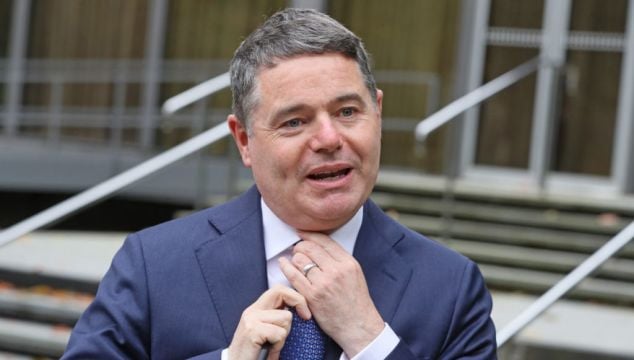The Minister for Finance has said tax receipts from corporation tax in Ireland will begin to decline from 2023 onwards.
On Wednesday, new figures revealed that Irish tax receipts surged to their highest ever level last year at €68.4 billion, reducing the Exchequer deficit down to €7.3 billion.
It is the highest recorded tax yield, and €9 billion more than the previous highest figure in 2019.
Corporation tax soared by almost 30 per cent, and is now the country’s second-largest revenue.
For years, a low corporate tax rate has been a key part of the Irish economic policy.
However, last year Ireland agreed to join the OECD framework for a global rate of 15 per cent tax, giving up its highly prized previous rate of 12.5 per cent.
On Thursday, Paschal Donohoe said he expects that from 2023 onwards Ireland will begin to see corporate tax revenue decline.
“If you look at where we are with this rate, overall Ireland will lose money and nobody knows this better than me,” he said.
“We’ll lose money because of two things happening. The first thing we will lose money from over time will be the full implementation of the global tax reform package.”
He added that this was not just the reformed rate of tax, but “the change that will happen regarding where tax is paid”.
“Secondly, many of the large taxpayers are in a position of very high profitability due to other things that have happened in the global economy.
“And we cannot, nor should we expect, that to continue. So we will get to a point where our corporate tax revenue – and I’ve been saying this in particular since 2018 – will come down,” he told RTÉ radio.
I’ll be on @TodaywithClaire shortly after 10 to discuss the exchequer returns published yesterday which showed the continued strength of our economy in 2021 despite the many challenges Covid-19 presented. Tune in if you can 📻 pic.twitter.com/NpG10mvr7G
Advertisement— Paschal Donohoe (@Paschald) January 6, 2022
He said that he expects that in the Government budget for 2023, the Irish corporate tax rate will be set at 15 per cent.
According to the latest data from the Department of Finance, consumer spending and an increase in wages helped bolster the tax figures.
The Department of Finance said that Ireland now gets €1 out of every €4.50 collected in overall tax revenue.

Figures from the department show an Exchequer deficit of €7.4 billion, an improvement of just under €5 billion compared with 2020.
Chief economist at the Department of Finance John McCarthy said that total spending for last year amounted to around €105.5 billion.
Capital spending amounted to almost €10 billion, an increase of around 3 per cent compared with 2020.







